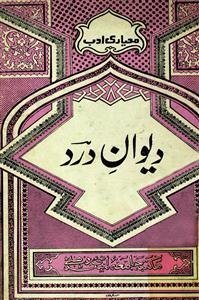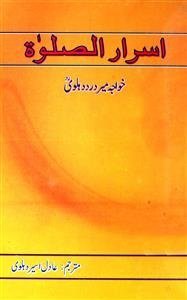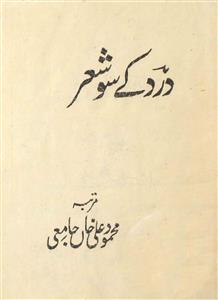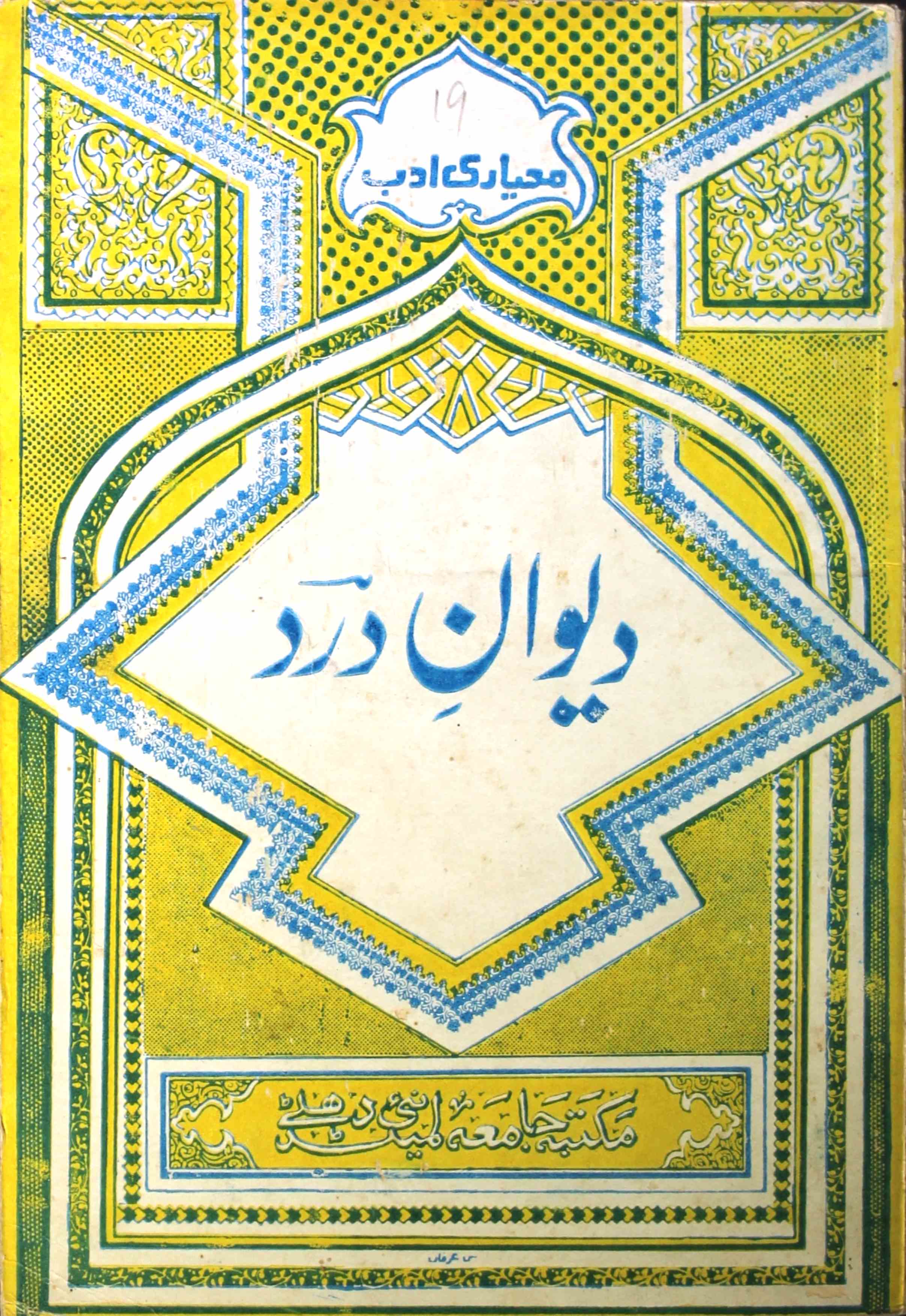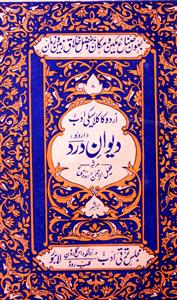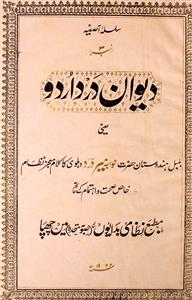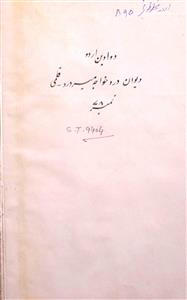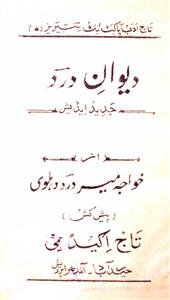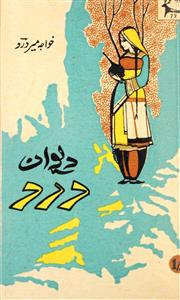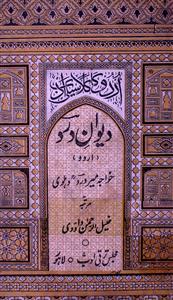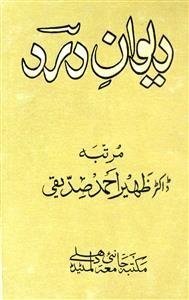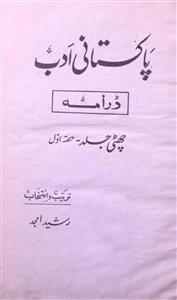 For any query/comment related to this ebook, please contact us at haidar.ali@rekhta.org
For any query/comment related to this ebook, please contact us at haidar.ali@rekhta.org
About The Book
خواجہ میر درد اردو کے دور اول کے شاعر ہیں، جن کا اردو دیوان بہت مختصر ہے۔ درد، میر تقی میر اور سودا کے معاصر تھے جن کو اردو شاعری میں سب سے اہم اور بڑے شاعروں میں شمارکیا جاتا ہے۔درد نے اپنی شاعری میں ایک الگ ہی جہان معنی تعمیر کیا ہے،میر درد کی شہرت کا سب سے بڑا سبب ان کا متصوفانہ کلام ہے۔ اردو کی صوفیانہ شاعری میں جو مقام اور مرتبہ درد کو حاصل ہے وہ اور کسی شاعر کے حصے میں نہیں آیا۔ ان سے بہتر صوفیانہ شاعری کے نمونے اردو میں کم ہی ملتےہیں۔ خواجہ میر درد کی شاعری میں تصوف کی جو تلمیحات نظر آتی ہیں یا جو اصطلاحیں اور استعارات دکھائی پڑتے ہیں اس کی وجہ یہی نظر آتی ہے کہ خواجہ صاحب کا تصوف سے گہرا رشتہ تھا۔ خواجہ صاحب کی شاعری کایہ کمال ہے کہ انھوں نے اپنے چھوٹے سے دیوان سے ایک بڑے حلقے کو متاثر کیا۔ ان کی شاعری میں گہری معنویت پوشیدہ ہے۔ ان کی غزلوں میں بلا کا تغزل پایا جاتا ہے۔ زیر نظر دیوان کو مکتبہ جامعہ دہلی نے شائع کیاہے، اس دیوان کے شروع میں رشید حسن خان کا جامع مضمون "تعارف"کے عنوان سے شامل کیا گیا ہے جس سے درد کے مقام اور ان کے دیوان کے دیگر نسخوں کے بارے میں معلومات حاصل ہوتی ہے۔
About The Author
Khwaja Mir Dard (1721-1785) was born Syed Khwaja in Delhi. His ancestors had migrated from Bukhara to India but his father who worked as a royal mansabdar relinquished his position to lead the life of a Sufi. Dard received his comprehensive religious education under the supervision of his father. He spent all his life in Delhi and remained a witness to the invasions of Nadir Shah and Ahmed Shah Abdali, as also the Maratha conquest of North-west India. He was, however, keenly interested in music, both vocal and instrumental and he held soirees of music, and mastered the art to perfection. As a Sufi, he was respected equally by the royalty and the nobility. This Sufi poet and theologian of the 18th Century Delhi is an important representative of the Naqshbandi, Mujaddidi lineage of Sufism. He is also known as the leader and theoretician of the Muhammadi path because he fashioned himself in the image of the Muhammad, the last prophet of Islam.
Dard had mastery over the Arabic, Persian, and Urdu languages. His close reading of the holy Qur’an, Traditions of the prophet, jurisprudence, and religious literature, made their mark on his poetry. His expertise in music further defined the tone and tenor of poetic expression. Effortless in his expression and direct in his addresses, he emerged as a renowned mystic poet, both in Persian and in Urdu. He was, by turn, an impassioned advocate for poetry and humble apologist for art. He considered poetry merely as one talent among the many talents of mankind. Poetry, to him, was inspired speech addressed to both the human and the divine. He differentiated between two types of speech, or kalaam, one of them being internal, or nafsi, and the other being verbal, or lafzi. He believed that a poet negotiates between two types of speech: the external, or zaahiri; and the internal, or batini. This reflection on language, speech, and expression underline the modes of Dard’s poetic apprehension and expression. He has to his credit a collection of Urdu ghazals, a Persian Divaan, a prose discourse called Ilm-ul Kitaab, a compilation of mystical sayings called Chahaar Risaala, and a book on the Muhammadi path.
 For any query/comment related to this ebook, please contact us at haidar.ali@rekhta.org
For any query/comment related to this ebook, please contact us at haidar.ali@rekhta.org
Write a Review
Jashn-e-Rekhta 10th Edition | 5-6-7 December Get Tickets Here
